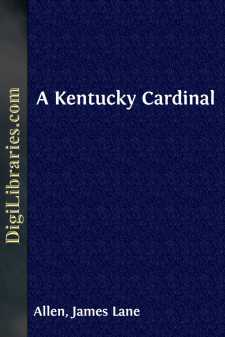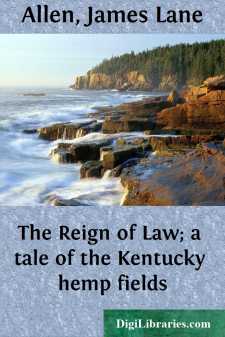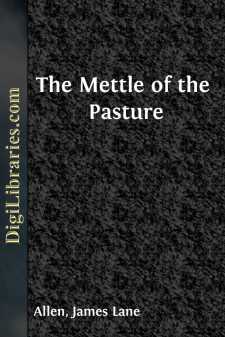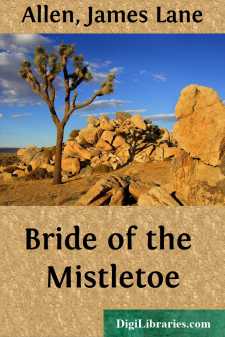Categories
- Antiques & Collectibles 13
- Architecture 36
- Art 48
- Bibles 22
- Biography & Autobiography 815
- Body, Mind & Spirit 144
- Business & Economics 28
- Children's Books 18
- Children's Fiction 14
- Computers 4
- Cooking 94
- Crafts & Hobbies 4
- Drama 346
- Education 58
- Family & Relationships 59
- Fiction 11834
- Games 19
- Gardening 17
- Health & Fitness 34
- History 1378
- House & Home 1
- Humor 147
- Juvenile Fiction 1873
- Juvenile Nonfiction 202
- Language Arts & Disciplines 89
- Law 16
- Literary Collections 686
- Literary Criticism 179
- Mathematics 13
- Medical 41
- Music 40
- Nature 179
- Non-Classifiable 1768
- Performing Arts 7
- Periodicals 1453
- Philosophy 65
- Photography 2
- Poetry 896
- Political Science 203
- Psychology 44
- Reference 154
- Religion 515
- Science 126
- Self-Help 85
- Social Science 82
- Sports & Recreation 34
- Study Aids 3
- Technology & Engineering 59
- Transportation 23
- Travel 463
- True Crime 29
James Lane Allen
James Lane Allen (1849-1925) was an American novelist and short story writer, celebrated for his depiction of Kentucky life and landscape. His most famous works, including "A Kentucky Cardinal" (1894) and "The Choir Invisible" (1897), highlight the pastoral beauty and social issues of the American South during the post-Civil War period. Allen's evocative storytelling and vivid descriptions earned him a lasting place in American literature.
Author's Books:
Sort by:
by:
James Lane Allen
I All this New-year's Day of 1850 the sun shone cloudless but wrought no thaw. Even the landscapes of frost on the window-panes did not melt a flower, and the little trees still keep their silvery boughs arched high above the jeweled avenues. During the afternoon a lean hare limped twice across the lawn, and there was not a creature stirring to chase it. Now the night is bitter cold, with no...
more...
by:
James Lane Allen
HEMP The Anglo-Saxon farmers had scarce conquered foothold, stronghold, freehold in the Western wilderness before they became sowers of hemp—with remembrance of Virginia, with remembrance of dear ancestral Britain. Away back in the days when they lived with wife, child, flock in frontier wooden fortresses and hardly ventured forth for water, salt, game, tillage—in the very summer of that wild...
more...
by:
James Lane Allen
I She did not wish any supper and she sank forgetfully back into the stately oak chair. One of her hands lay palm upward on her white lap; in the other, which drooped over the arm of the chair, she clasped a young rose dark red amid its leaves—an inverted torch of love. Old-fashioned glass doors behind her reached from a high ceiling to the floor; they had been thrown open and the curtains looped...
more...
by:
James Lane Allen
When Sister Dolorosa had reached the summit of a low hill on her way to the convent, she turned and stood for a while looking backward. The landscape stretched away in a rude, unlovely expanse of grey fields, shaded in places by brown stubble, and in others lightened by pale, thin corn—the stunted reward of necessitous husbandry. This way and that ran wavering lines of low fences, some worm-eaten,...
more...
by:
James Lane Allen
I I was happily at work this morning among my butterbeans—a vegetable of solid merit and of a far greater suitableness to my palate than such bovine watery growths as the squash and the beet. Georgiana came to her garden window and stood watching me. "You work those butterbeans as though you loved them," she said, scornfully. "I do love them. I love all vines." "Are you...
more...
by:
James Lane Allen
EARTH SHIELD AND EARTH FESTIVAL A mighty table-land lies southward in a hardy region of our country. It has the form of a colossal Shield, lacking and broken in some of its outlines and rough and rude of make. Nature forged it for some crisis in her long warfare of time and change, made use of it, and so left it lying as one of her ancient battle-pieces—Kentucky. The great Shield is raised high out...
more...
by:
James Lane Allen
A Cathedral Singer Slowly on Morningside Heights rises the Cathedral of St. John the Divine: standing on a high rock under the Northern sky above the long wash of the untroubled sea, above the wash of the troubled waves of men. It has fit neighbors. Across the street to the north looms the many-towered gray-walled Hospital of St. Luke—cathedral of our ruins, of our sufferings and our dust, near the...
more...








